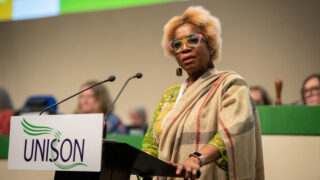The holy Muslim month of Ramadan falls neatly across April this year. Fasting began on 2 April and Eid-al-Fitr, the celebration that marks the end of Ramadan, is expected to fall on 1 May.
During this important holy period for Muslims, UNISON reminds both workers and employers that it is within the Equality Act 2010 for all employers to ensure flexible working and provide reasonable adjustments for staff wishing to observe Ramadan, which includes fasting, prayers, charity and reflecting on the Quran.
Workplace advice: flexible working
Tell MAMA have produced useful employers’ guidance on how Muslims can be supported at work during Ramadan. Advice includes:
- Consider the energy levels of staff, especially where work is physically demanding, and where possible, scheduling meetings earlier in the day and avoiding evening meetings or work events;
- Avoid scheduling lunchtime events;
- Be fair and considerate in the distribution of additional rest breaks;
- As the month of Ramadan is aligned with the lunar calendar, Eid-al-Fitr has no fixed date. Employers are encouraged to be flexible with their annual leave requests from Muslim workers around this time.
Guidance from ACAS and the EHRC provides employers with a range of best practices during the holy month, for example, by allowing Muslim staff longer on Fridays for Jummah prayers, by arriving or starting their working day earlier.
A 2021 survey of British Muslims on support from employers during Ramadan found that the most supportive adjustment (desired by 69% of recipients) was flexible shift patterns, followed by team members understanding what Ramadan means to them (60%), and annual leave for the final days of Ramadan (58%).
Understanding fasting, and how to support Muslim colleagues
To wish someone a Happy Ramadan, the greeting most commonly used is ‘Ramadan Mubarak’. This translates to ‘blessed Ramadan’. Another commonly used greeting is ‘Ramadan Kareem’, which translates to ‘generous Ramadan’.
Fasting is an act of worship, and considered as a positive act of self-improvement. Fasting during Ramadan is one of the five pillars of Islam – the principles that Muslims follow – and carries great significance during the holy month.
During Ramadan, Muslims spend a period of 30 days abstaining from food and drink, including water, during daylight hours, as a means of celebrating and reflecting on their faith. Iftar, the meal that breaks the fast when the sun has set, is often shared with family and community.
Wishing all Muslim members Ramadan Mubarak, UNISON national officer for race equality Margaret Greer said: “UNISON is here to support all our Muslim members through this important month, as families and communities come together to celebrate, and encourages non-Muslim members to take this opportunity to learn more about the importance of this month, and how to support Muslim co-workers.”




